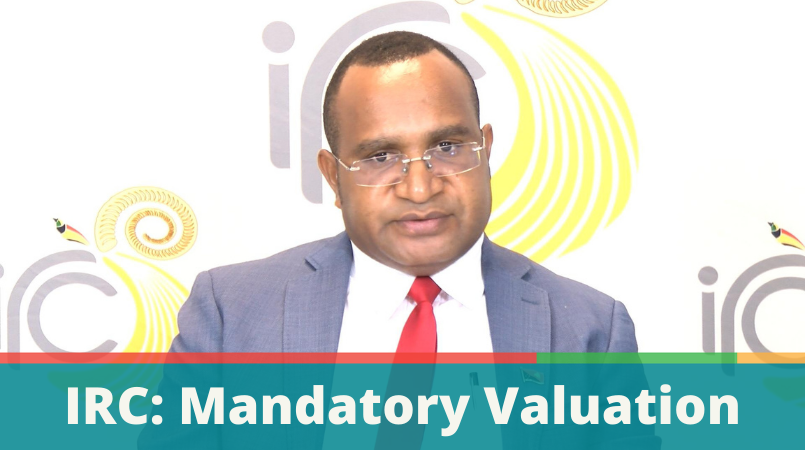
The Internal Revenue Commission (IRC) has issued a notice concerning the mandatory requirement for valuation of property for Stamp Duty purposes.
The notice was issued to taxpayers, real estate agents, conveyance lawyers, banks, land registry officials, and others involved in land transactions (both sellers and buyers) and the general public.
In a press conference on Friday 1 October, IRC Commissioner General Sam Koim announced the mandatory valuations, saying the IRC has uncovered many instances of gross evasion of stamp duties and undervaluation of properties, thus a requirement for mandatory evaluation.
As of October 1 2021, all applications for stamp duty for transfer of real property and acquisition of interests in landholding companies will be subjected to mandatory valuation. For transfers valuing below K10 million, IRC will meet costs of valuation. For transfers exceeding K10 million, the purchaser will meet the costs of valuation. IRC is empaneling a number of valuers to undertake the valuation as and when the need arises.
In the Stamp Duty Application Forms and the transfer instruments, IRC requires the description of property to be particularized, for instance, Allotment xx, Section yy, Hohola, NCD, can mean Gerehu, Waigani, Tokarara, etc., and hence confusing. IRC insists on descriptions like the following:
3 x 3 Bedroom Apartments, Allotment 3, Section 30, Henao Drive, Gordons, NCD.
Koim warned that, “The transfer instruments that are being filled in and the declarations that are made which are deemed or which are found to be fraud, can invalidate the entire contract. Under the land registration act, that is a provision that you can invalidate a land title on the basis of fraud.
“So this message goes to banks as well, or property real estate agents and whoever facilitating it, if the property is valued significantly lower, and we find that the property transfer has been procured through fraud then the title can be invalidated and that’s a serious matter that all interested parties should know,” Koim said.
The Stamp Duties Act empowers IRC to initiate the valuation of properties in appropriate circumstances. The requirement for valuation is not designed to interfere with the free market but to detect fraud and evasion of stamp duty taxes.
Koim said, “We are not trying to interfere into the open and free market of property sale and purchase, the supply and demand powers that operate in the free market…what we are doing is for our purposes. What we are doing is trying to detect fraud and evasion that is taking place.”
IRC is aware of instances where the purchaser tries to get away with paying less stamp duty, or even none, than is due to the government. Such land transactions designed to defraud the government are not only invalid but also illegal. When completing transactions forms, purchasers have been known to insert a money figure that turns out to be less in value than the property for which land was exchanged.
A buyer is not a bona fide purchaser where a buyer inserts a lower purchase price on a transfer form than the amount actually paid in order to defraud the government of revenue. It is IRC’s considered position that since a transaction of this nature is illegal, a title deed acquired in such circumstances would be void because of fraud.
IRC informs that fraud would invalidate the transaction. For example, for transfer of real property, section 33 of the Land Registration Act 1981 can be invoked to invalidate a transfer of title on the grounds of fraud.
IRC warns those who intentionally evade or attempt to evade any stamp duty and those who aid and abet others to escape taxes, will be charged administratively and criminally.
IRC stated that they are profiling several cases for possible prosecution.
